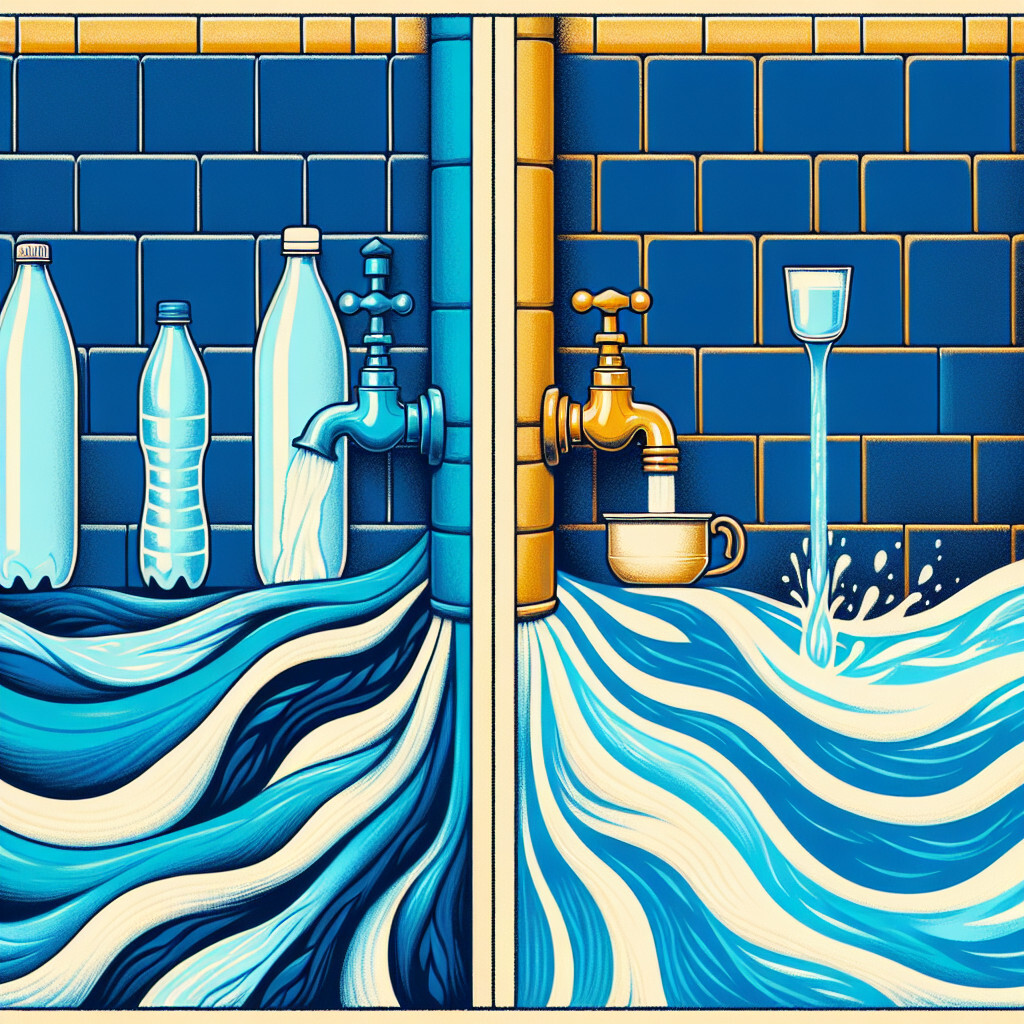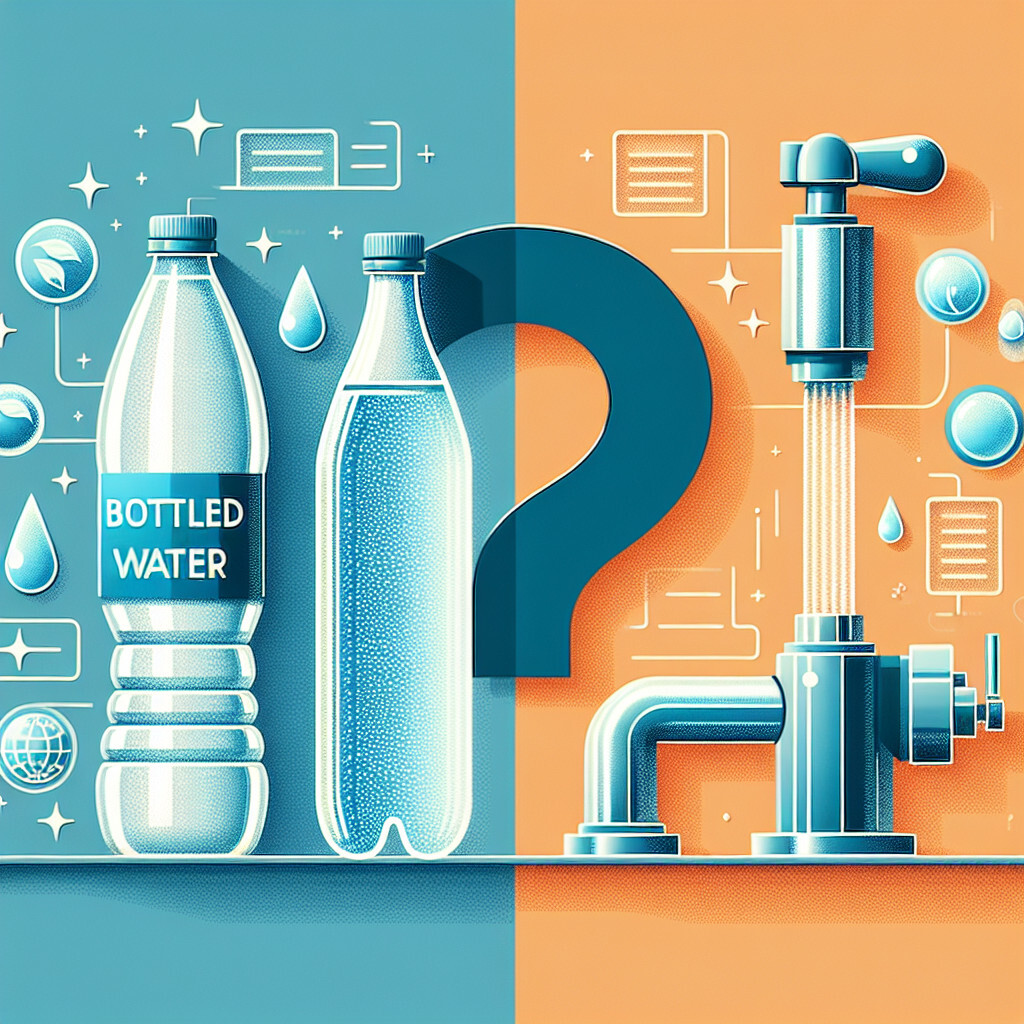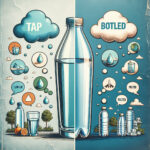-
Table of Contents
“UK’s Tap vs. Bottled: Unveiling the True Essence of Hydration”
Introduction

Bottled water and tap water in the UK are both safe to drink, however, there are several factors that differentiate them. The quality of tap water in the UK is among the highest in the world, regulated by strict standards to ensure its safety. On the other hand, bottled water is often preferred for its convenience and perceived purity. However, it is more expensive and has a greater environmental impact due to plastic waste. Therefore, whether bottled water is better than tap water in the UK depends on individual preferences, environmental considerations, and cost factors.
Comparing the Quality: Bottled Water vs Tap Water in the UK
In the United Kingdom, the debate over the superiority of bottled water versus tap water is a topic of ongoing discussion. The quality of both sources of water is regulated by stringent standards, yet the perception of their relative merits varies widely among the populace. This article aims to provide an informative comparison of the quality of bottled water and tap water in the UK, shedding light on the key factors that influence their respective reputations.
Bottled water, often perceived as the cleaner and safer option, is subject to rigorous testing and regulation. In the UK, it is governed by the Natural Mineral Water, Spring Water and Bottled Drinking Water Regulations 2007, which are enforced by the Food Standards Agency. These regulations stipulate that bottled water must be free from pollutants, harmful bacteria, and parasites. Furthermore, it must meet specific microbiological safety and quality standards. The water is tested at source, and the bottling process is designed to prevent contamination, ensuring that the water remains pure until it reaches the consumer.
However, it is important to note that the quality of bottled water can vary depending on the brand and the source. Some brands use groundwater, while others use spring or mineral water. The source can significantly influence the taste and mineral content of the water. Therefore, while bottled water is generally safe and of high quality, it is not necessarily superior to tap water in terms of health benefits.
On the other hand, tap water in the UK is also subject to stringent regulations and testing. The Water Supply (Water Quality) Regulations 2016 govern the quality of tap water, ensuring it is safe for consumption. The water companies are required to carry out regular testing for a range of parameters, including microbiological, chemical, and aesthetic aspects. The results of these tests are publicly available, providing transparency about the quality of tap water.
Moreover, tap water in the UK is treated with a small amount of chlorine to kill bacteria and other microorganisms, ensuring its safety. While this can slightly affect the taste, it does not pose a health risk. In fact, tap water often contains fluoride, which is beneficial for dental health, a feature that most bottled waters lack.
However, the quality of tap water can also vary depending on the region. Factors such as the local water source and the condition of the water supply infrastructure can influence the taste and quality of tap water. Therefore, some people may prefer the taste of bottled water, particularly if they live in an area where the tap water has a strong flavour.
In conclusion, both bottled water and tap water in the UK are subject to rigorous testing and regulation, ensuring they are safe for consumption. The choice between the two often comes down to personal preference, particularly in terms of taste. While bottled water may be convenient for on-the-go consumption, tap water is a more environmentally friendly and cost-effective option. Therefore, it is advisable to consider these factors when deciding which type of water to consume.
The Environmental Impact: Bottled Water versus Tap Water in the UK
In the United Kingdom, the debate between bottled water and tap water has been a topic of discussion for many years. While some people prefer the convenience and perceived purity of bottled water, others advocate for the environmental benefits and cost-effectiveness of tap water. However, when it comes to the environmental impact, the comparison between the two becomes even more significant.
Bottled water, despite its popularity, has a substantial environmental footprint. The production process involves extracting water, often from natural springs, which can disrupt local ecosystems. The water is then treated, bottled, and transported, sometimes over long distances. This entire process consumes considerable energy and contributes to greenhouse gas emissions. Furthermore, the plastic bottles themselves are a significant source of pollution. In the UK, it is estimated that 38.5 million plastic bottles are used every day, and only just over half make it to recycling, while more than 16 million are put into landfill, burnt or leak into the environment and oceans each day.
On the other hand, tap water in the UK is subject to rigorous testing and strict quality standards, making it one of the safest and cleanest in the world. It is delivered straight to homes and businesses through an extensive network of pipes, requiring less energy for transportation. Moreover, drinking tap water reduces the need for plastic bottles, thereby mitigating the associated environmental issues.
However, it is important to note that the provision of tap water also has an environmental impact. The process of treating and delivering tap water to households involves energy use and can result in the release of greenhouse gases. Additionally, water leakage from pipes is a significant issue in the UK, with an estimated 3 billion litres of water lost daily. This not only wastes water but also the energy used in its treatment and distribution.
Despite these issues, the environmental impact of tap water is generally lower than that of bottled water. A study by the Environmental Working Group in the US found that bottled water production in the US used up to 2,000 times the energy cost of producing tap water. While UK-specific data is less readily available, the energy costs of bottled water production and the pollution caused by plastic waste suggest that the situation is likely to be similar.
In conclusion, while both bottled and tap water have environmental impacts, the weight of evidence suggests that tap water is the more environmentally friendly option in the UK. This is due to the lower energy costs associated with its production and distribution, and the absence of plastic waste. However, it is crucial that efforts are made to further reduce the environmental impact of tap water provision, particularly in relation to water leakage. As consumers, we can also play a part by using refillable water bottles and filters, and by choosing tap water over bottled water where possible. This not only helps to reduce our individual environmental footprints but also supports a more sustainable and resilient water system for the future.
Health Implications: Is Bottled Water Safer than Tap Water in the UK?
In the United Kingdom, the debate over the safety and health implications of bottled water versus tap water is a topic of considerable interest. Many people believe that bottled water is safer and healthier than tap water, but is this really the case? Let’s delve into the matter.
Firstly, it is important to understand that the quality of tap water in the UK is among the highest in the world. The Drinking Water Inspectorate (DWI), a government body, is responsible for ensuring that water companies supply safe drinking water that is fit for human consumption. The DWI conducts rigorous testing and monitoring of tap water, ensuring it meets stringent standards. In fact, tap water in the UK is tested more frequently than bottled water, with companies required to carry out tests daily, compared to the weekly or monthly tests for bottled water.
However, the perception that bottled water is safer than tap water persists. This is largely due to effective marketing strategies by bottled water companies, which often portray their products as being purer and healthier. Yet, it’s worth noting that bottled water is not necessarily free from contaminants. The Natural Hydration Council, a UK body that promotes the consumption of water, states that bottled water can contain substances such as bacteria, algae, viruses, fungi, minerals, and man-made pollutants.
Moreover, the plastic bottles in which water is packaged can also pose health risks. Some plastic bottles contain chemicals like Bisphenol A (BPA), which can leach into the water, especially when exposed to heat. BPA has been linked to a variety of health problems, including hormonal disruptions and increased risk of certain cancers.
On the other hand, tap water in the UK is treated with chlorine to kill bacteria and other microorganisms. While this makes the water safe to drink, some people may be sensitive to the taste or smell of chlorine. Additionally, tap water can contain trace amounts of other substances, such as lead from old pipes. However, the levels of these substances are strictly regulated and monitored to ensure they remain within safe limits.
In terms of nutritional content, both bottled and tap water can provide essential minerals. Some brands of bottled water are fortified with additional minerals, but the amounts are usually small and unlikely to make a significant difference to your overall nutrient intake. Tap water, particularly in hard water areas, can be a good source of calcium and magnesium.
In conclusion, both bottled water and tap water in the UK are generally safe to drink. The choice between the two often comes down to personal preference, whether that’s based on taste, convenience, or environmental considerations. However, it’s important to remember that the perception of bottled water being safer or healthier than tap water is largely a myth. In fact, tap water in the UK is subject to more rigorous testing and regulation than bottled water. Therefore, if you’re in the UK and have access to clean tap water, there’s no compelling health reason to choose bottled water instead.
Economic Analysis: The Cost of Bottled Water vs Tap Water in the UK
In the United Kingdom, the debate over the superiority of bottled water versus tap water has been a topic of discussion for many years. While some people argue that bottled water is safer and tastes better, others contend that tap water is just as good, if not better, due to its lower cost and environmental friendliness. This article will delve into the economic analysis of the cost of bottled water versus tap water in the UK.
To begin with, it is important to note that the cost of bottled water in the UK varies significantly depending on the brand and the location of purchase. On average, a litre of bottled water costs around £0.65, although premium brands can cost up to £2 per litre. In contrast, tap water costs approximately £0.001 per litre, making it significantly cheaper than bottled water.
The cost difference becomes even more pronounced when considering the annual expenditure on water. For instance, if a person consumes two litres of water per day, they would spend around £474 per year on bottled water, assuming an average cost of £0.65 per litre. On the other hand, the same amount of tap water would cost just £0.73 per year. This stark difference in cost is a compelling argument in favour of tap water.
However, the economic analysis of bottled water versus tap water extends beyond the direct cost to the consumer. There are also indirect costs associated with the production, transportation, and disposal of bottled water. The production of plastic bottles requires petroleum, a non-renewable resource, and generates carbon emissions, contributing to climate change. The transportation of bottled water, often across long distances, further adds to its carbon footprint.
Moreover, the disposal of plastic bottles poses a significant environmental challenge. In the UK, only around half of all plastic bottles are recycled, with the rest ending up in landfill or the ocean. The cost of managing this waste, as well as the environmental damage it causes, is borne by society as a whole.
In contrast, tap water has a much lower environmental impact. It is delivered through an existing infrastructure, reducing transportation costs and carbon emissions. Furthermore, drinking tap water does not generate plastic waste, making it a more sustainable choice.
However, it is worth noting that the quality of tap water can vary depending on the location. In some areas of the UK, tap water may have a noticeable taste due to the presence of certain minerals or chemicals. While this does not necessarily mean that the water is unsafe, it may lead some people to prefer bottled water.
In conclusion, from an economic perspective, tap water is a far more cost-effective choice than bottled water in the UK. Not only is it cheaper for the consumer, but it also has lower indirect costs associated with its production, transportation, and disposal. However, the preference for bottled or tap water ultimately depends on individual tastes and perceptions of quality. Regardless, it is clear that the economic argument strongly favours tap water.
Q&A
1. Question: Is bottled water safer than tap water in the UK?
Answer: No, tap water in the UK is among the safest in the world and is subject to more stringent safety checks than bottled water.
2. Question: Does bottled water taste better than tap water in the UK?
Answer: Taste is subjective and can vary from person to person. Some may prefer the taste of bottled water, while others may prefer tap water.
3. Question: Is bottled water more environmentally friendly than tap water in the UK?
Answer: No, tap water is more environmentally friendly as it requires less energy to produce and does not generate plastic waste like bottled water.
4. Question: Is bottled water more expensive than tap water in the UK?
Answer: Yes, bottled water is significantly more expensive than tap water in the UK.
Conclusion
In conclusion, whether bottled water is better than tap water in the UK largely depends on personal preference as both are safe to drink. However, considering environmental impact and cost, tap water is generally better. It’s regulated by strict quality standards, is much cheaper, and doesn’t contribute to plastic waste.






